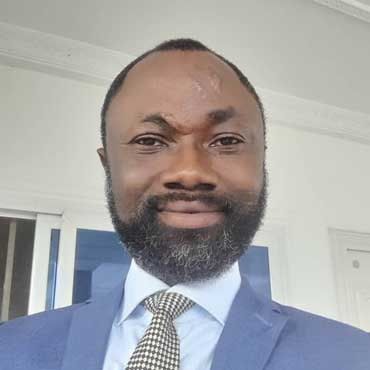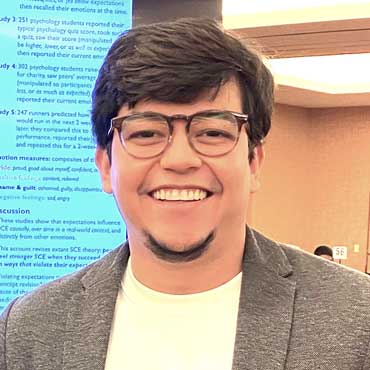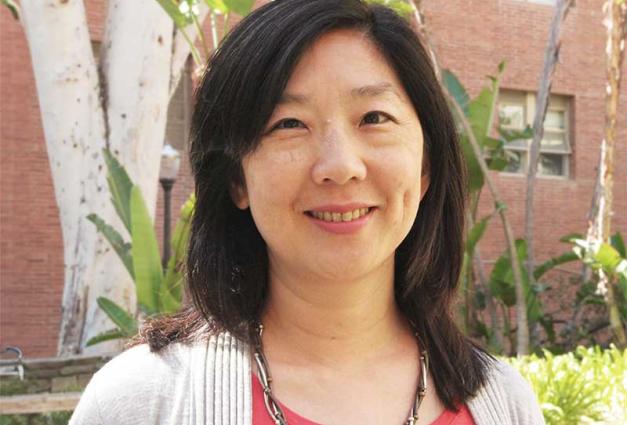The senior editorial team at Personality and Social Psychology Review (PSPR) is thrilled to announce the selection of Stephen Baffour Adjei as the inaugural Editorial Fellow. Dr. Adjei is a Senior Lecturer at Akenten Appiah-Menka University of Skills Training and Entrepreneurial Development (AAMUSTED) in Kumasi, Ghana. Learn more about Dr. Adjei below.
The Editorial Fellowship is sponsored by SPSP, in service of the organization's core values of innovation, rigor, diversity, and inclusiveness. This pilot program seeks to create a supportive pathway to editorial leadership for psychologists from communities that have been historically excluded from these roles. In contrast to many editorial fellowship programs in academic psychology, the PSPR senior editorial team sought to focus this fellowship on scholars in the Global South and Indigenous scholars across the world. A 2022 study by Zeineddine and colleagues found that scholars working in the Global South experience substantial "disadvantages in human, material, and social-political capital" that reinforce systemic and structural inequities. The PSPR senior editorial team sought to use this fellowship to begin to address these inequities and is confident that this fellowship will enhance the quality of the journal and the field. They are particularly excited about the scientific insights and theoretical advances that can emerge when the geographic, social, political, and economic contexts in which psychological science is conducted are broadened. The team also hopes to encourage more scholars from the Global South to submit their best theoretical work to PSPR.
The team received over 60 applications and interviewed five finalist candidates (from Ghana, Iran, Nigeria, Rwanda, and Zimbabwe) before selecting Dr. Adjei. Among his many other qualifications, the team was impressed with Dr. Adjei's passion for taking what he learns through the fellowship to educate colleagues in his networks about how to navigate Western journals in personality and social psychology. Dr. Adjei is a member of the American Psychological Association's Global Psychology Learning Leadership Institute and currently serves as President of the University Teachers Association of Ghana.
"We were overwhelmed by the number of excellent candidates," PSPR Editor Jonathan Adler said. "Overseeing this fellowship selection process truly reinforces the notion that our field is flourishing across the globe, but American and European-dominated journals and societies often maintain systems that exclude amazing colleagues working elsewhere. We have tried to cultivate a culture at PSPR that amplifies less-commonly heard voices and we see the number of excellent applications we received as evidence that doing so will help change the field."
PSPR has invited the other finalists, along with several other applicants, to join the journal's Editorial Board.
The Editorial Fellowship is only one of the many initiatives designed to diversify the field that the PSPR senior editorial team has undertaken since beginning their term in 2022. The team is proactively recruiting new authors, conducting a retrospective study of the journal's authorship since it was founded, and has formed an Emerging Editor Board. This Board is composed of advanced graduate students and postdoctoral fellows interested in pathways toward editorial leadership. The senior editorial team oversaw a competitive process of selecting the Emerging Editor Board's members in March 2022. Since then, every manuscript that the editors have sent for peer review was also sent to an Emerging Editor. The senior editorial team has taken care not to burden Emerging Editors with review work while providing developmental feedback on each review they submit to the journal. The Emerging Editor Board has over 80 members each of whom represents an incredibly bright future for the field. To illustrate this Board, we have reached out to two Emerging Editors for brief interviews about their work and their experience working for PSPR, which you can read below.
The senior editorial team at PSPR is committed to sharing the many efforts they have already made toward fostering a different kind of editorial culture and welcomes the opportunity to speak with any department, conference, or network about them.
Q&A with Inaugural PSPR Editorial Fellow
Stephen Baffour Adjei, PhD
 Senior Lecturer in the Department of Interdisciplinary Studies at Akenten Appiah-Menka University of Skills Training and Entrepreneurial Development (AAMUSTED) in Kumasi, Ghana
Senior Lecturer in the Department of Interdisciplinary Studies at Akenten Appiah-Menka University of Skills Training and Entrepreneurial Development (AAMUSTED) in Kumasi, Ghana
Will you please tell us a little about your own research?
I generally apply my research to understand the interactional complexities between culture, context, and psychological processes. Specifically, my research focuses on such topics as interpersonal violence, with a particular emphasis on intimate partner violence; critical African psychology; decolonizing knowledge and being; the psychology of human development and learning; masculinities and male shame; personhood, identity and agency in sociocultural contexts; psychosocial/cultural experiences of people with disabilities; and discourse analysis/discursive psychology. I generally apply qualitative approaches in my research, with an emphasis on discursive psychology/discourse analysis. My research is informed broadly by cultural psychological theories and concepts such as the African communitarian philosophy and theory of being/personhood, and decolonial perspectives.
Why were you interested in the Editorial Fellowship?
In my career as a non-Western academic, I have always perceived Western journals, particularly APA journals, as extremely difficult for non-Western scholars to publish in, partly because of the editors' understanding of what should count as valid knowledge and good science. As someone whose work is informed by decolonial perspectives, this Editorial Fellowship offers me a unique opportunity to connect with and learn from Senior Editors from one of the flourishing Western-informed journals in the field of personality and social psychology, and to share my learnings and lessons with my social and professional networks, and hopefully also with Western academics, with the goal of disrupting (decolonizing) the editorial process. The fellowship further provides the platform for me to develop my editorial leadership skills and professional competence for the benefit of particularly young scholars in Africa.
Will you please describe how you hope to share what you learn from the fellowship more broadly?
I plan to share my learnings and lessons from this Editorial Fellowship through my professional and social networks and platforms such as the Ghana Psychological Association, University Teachers Association of Ghana, American Psychological Association's Global Psychology Learning Leadership Institute, and social media platforms. I also hope to share my experiences with graduate students and early career scholars in Africa, and elsewhere, through seminar presentations and collaborative discussions.
Will you please offer a wish for the future of our field?
It is my wish that future personality and social psychological research and practice will be a truly global science by creating more equitable participatory spaces for the inclusion of indigenous knowledge and decolonial perspectives on social/human behavior in order to guarantee individuals' and research communities' access to alternative forms of knowledge and understanding for improving the human condition.
Q&A with Members of PSPR Emerging Editor Board
Emerson Do Bú
 Fifth-year PhD candidate at the Institute of Social Sciences in the Department of Psychology at the University of Lisbon, Portugal.
Fifth-year PhD candidate at the Institute of Social Sciences in the Department of Psychology at the University of Lisbon, Portugal.
Will you please tell us a little about your own research?
My research centers on the impact of patients' race on healthcare providers' decision-making, focusing on the amount of time invested in assessing and recommending treatments for patients. Given that time is a scarce and highly valued resource that individuals tend to invest more in members of their own group (i.e., the Intergroup Time Bias effect), I am experimentally examining whether White medical trainees invest more time making clinical decisions on White than Black patients. Additionally, I am investigating a possible psychological mechanism (i.e., aversion) that may be at play. My research draws upon the Social Identity and Aversive Racism theories.
Why did you want to join the Emerging Editor Board and will you please describe your experience on the Emerging Editor Board so far?
As a PhD candidate in social psychology, I was highly motivated to join PSPR's Emerging Editor Board, as it offered an intellectually stimulating opportunity to not only learn but also contribute to the advancement of social psychology. So far, my experience on the Board has been incredibly rewarding. Reviewing manuscripts has given me a chance to engage with cutting-edge theoretical work and provide feedback to authors, which has helped me to develop my own critical thinking and evaluation skills. I am excited to continue learning and contributing to the field through this role.
Will you please offer a wish for the future of our field?
It is my hope that social and personality psychology will become a more inclusive and diverse field that more accurately reflects the global population. To achieve this, I believe it is crucial to reduce publication bias against authors from underrepresented groups, allowing their research to be fairly evaluated and disseminated in mainstream social psychology journals. To further support this goal, I hope that other social and personality psychology journals will follow PSPR's initiatives by creating editorial boards that are as diverse as possible, taking into account geopolitical factors, and offering opportunities to PhD candidates like myself, a Latino from Brazil, to contribute to the field. Moreover, I expect the field to continue to advance and enhance its research practices by fully embracing open science principles, ensuring transparency and reproducibility. Lastly, I hope that the knowledge gained through social psychological research can be used more intensely to promote positive social change and address pressing social issues.
Hasagani Tissera
 Sixth-year PhD Candidate in the Department of Psychology at McGill University, Canada.
Sixth-year PhD Candidate in the Department of Psychology at McGill University, Canada.
Will you tell us a little about your own research?
My program of research focuses on metaperceptions (i.e., our beliefs about how we are seen by others). More precisely, employing a componential approach, I have decomposed metaperceptions into positivity and accuracy and explored their independent correlates relating to both personal and social well-being. I have examined this question in first impressions and in the context of close relationships, such as romantic relationships.
Why did you want to join the Emerging Editor Board and will you please describe your experience on the Emerging Editor Board so far?
I joined the Emerging Editor Board at PSPR to obtain greater experience with and contribute to the peer-review process that sits at the center of the publication of psychological research. This experience has proven to be an important developmental opportunity. For example, during this past year, I have sharpened important skills such as how to review research critically and how to express constructive and actionable feedback to authors in ways that maximize the impact and quality of their work. In addition, these skills have also helped me to elevate the quality of my own research.
Will you please offer a wish for the future of our field?
I hope this initiative from PSPR encourages other journals in the field to adopt similar developmental approaches that help trainees gain experience with the peer-review process. In doing so, we will move a step closer to not only providing young scholars with well-rounded training but also enhancing the quality of psychological research outputs.




